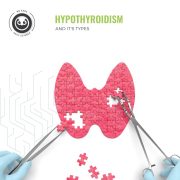Hypothyroidism – What to eat and what not to?
In our last blog, Yoda told us a lot about the thyroid gland and the condition of an overactive thyroid gland. Today, we’ll be discussing in detail the polar opposite, an underactive thyroid. From types to causes, and the different dietary measures that you should take to bring your thyroid secretions levels to optimum, here’s everything you need to know about hypothyroidism.
What is hypothyroidism?
We’ve established how important the thyroid gland and the hormones it secretes are to maintain equilibrium in our health and body composition. Hypothyroidism is a condition where your thyroid hormone is secreting less than optimal amounts of thyroid hormones, such as TSH and T4. This can slow down the metabolism severely and can increase the risks of heart complications, myxedema, and a lot of other conditions.
There are three main types of hypothyroidism.
- Overt hypothyroidism – elevated serum TSH levels with low serum T4 levels
- Subclinical hypothyroidism – elevated serum TSH levels with serum T4 levels within the normal range (also known as mild thyroid failure)
- Congenital hypothyroidism – due to deficiency in TSH and T4 levels
That’s not all, though. An auto-immune condition called Hashimoto’s can also be the reason why the thyroid gland is underactive.
Why the malfunction?
There are quite a few reasons for the condition.
Any damage or disease related to the hypothalamus or pituitary gland might cause damage to the cells that secrete TSH.
Medications that contain high doses of lithium, iodine, or amiodarone can suppress hormone secretion.
Radiation therapy to treat thyroid cancers of the neck or head can affect the thyroid gland.
Apart from these, there are other reasons like autoimmune diseases (like Hashimoto’s), surgeries to remove the thyroid gland, low or no iodine in the diet and other environmental factors such as stress can be the causes of an under-active thyroid gland.
Hashimoto’s is an auto-immune condition where your body’s defense systems are attacking tissues in the thyroid gland, resulting in an under secreting gland. Possible reasons could be genetic history, viral infections, or environmental triggers like stress or exposure to radiation.
How do I know if I have hypothyroidism?
The foolproof way to do this is to get checked. To monitor levels of TSH and take other tests that can provide conclusive evidence of whether you have hypothyroidism or not. However, there are a few symptoms that you can watch out for.
- Pervasive fatigue
- Forgetfulness
- Difficulty with learning
- Dry skin, brittle hair, and nails
- Puffy face
- Constipation
- Sore muscles
- Weight gain and fluid retention
- Heavy and/or irregular menstrual flow
- Increased frequency of miscarriages
- Increased sensitivity to cold
Diagnosis
You can monitor TSH levels, yes, but that’s not the only test out there to find out if you have hypothyroid. Physicians also look for any anti-thyroid antibodies and T4 levels to find out if the thyroid gland is underactive.
What diet is the best for hyperthyroidism?
There’s no blanket diet here. It depends on a lot of other factors that are particular to your body. Other related conditions and critical health indicators should be taken into consideration to arrive at the optimal nutrition protocol for you. However, there are general rules of thumb when it comes to hypothyroidism, and here are a few things to keep in mind.
TL;DR –
Things to avoid – excessive salt, red meat, soy, and gluten.
Things to add to diet – Iodine, antioxidants, seafood.
Please avoid excessive salt, red meat, soy, and soy-related products and gluten food. You’ll have to lay off the soy because genistein, a major soy isoflavone, has an estrogenic and goitrogenic activity which inhibits the activity of thyroid peroxidase. Going gluten-free helps because according to studies, there might be an overlap between celiac disease and Hashimoto’s. Gluten might also cause a leaky gut which will trigger the body to produce antibodies that might attack the thyroid gland.
You can however eat foods that are rich in iodine and antioxidants. Iodine deficiency is the major cause of hypothyroidism. Seafood is a great addition to a hypothyroid-friendly diet. Plan your diet around these do’s and don’ts!
Should I be worried?
Any chronic illness comes with its own complications and risk factors. Leaving hypothyroidism unchecked for prolonged periods can cause heart complications, depression, slowed mental functioning, loss of libido, birth defects, and myxedema.
There is a myth that hyperthyroidism is a disease for middle-aged women. It is not true. If you’re experiencing symptoms, or even if you’re not getting your thyroid levels checked periodically. Follow nutritional protocols. Get in touch with our team of nutritionists to stay on top of the hypothyroid condition!



